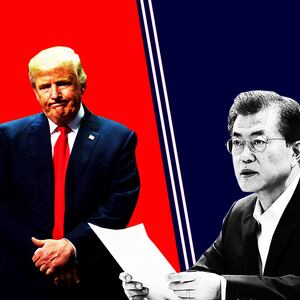The old Korean Central Intelligence Agency, a fearsome tool of terror for bygone South Korean dictators, has now lost the right to spy on politicians and torture foes of the regime. Instead the agency, renamed the National Intelligence Service years ago, is morphing into an instrument for North-South Korean reconciliation.
Nothing shows the changing role of the NIS more sharply than the appointment by South Korea’s liberal President Moon Jae-in of an old-time leftist politico as NIS director. Imprisoned in 2006 for agreeing to send North Korea $500 million to bring about the first North-South Korean summit in June 2000— between then-South Korean President Kim Dae-jung and North Korea’s Kim Jong Il, father of current ruler Kim Jong Un—the 78-year-old Park Jie-won hopes to use the agency to get back in the good graces of the North Koreans.
The NIS may still engage in routine intelligence-gathering, but Park, who was Kim Dae-jung’s closest aide, envisions the agency pursuing “peace, cooperation and unification” of the two Koreas. As for his signature on an old document promising payoffs to North Korea, he called it “fake,” a forgery.
The controversy over the signature revived memories of the scandal in which Park was alleged to have signed an “agreement on economic cooperation” with North Korea before the June 2000 summit. The document states the payoffs came to $3 billion, including another $2.5 billion in long-term aid and investment, all to get Kim Jong Il to agree to host Kim Dae-jung in Pyongyang. Several months later, “DJ,” as he was widely known, won the Nobel Peace Prize for which he had been lobbying for years.
Park might say he knew nothing, but he was sentenced in 2006 to three years in prison for arranging payoffs that critics say aided and abetted North Korea’s rise as a nuclear power. Some have claimed the final total sent to North Korea amounted to far more. In any event North Korea conducted its first underground nuclear test in 2006 and has staged five more since then, most recently in September 2017.
Interestingly, Park had served only eight months in prison before he was freed by Kim Dae-jung’s equally liberal successor, Roh Moo-hyun, on the advice of his chief of staff Moon Jae-in—yes, the same Moon who, as president, has shown his full faith in Park by naming him NIS director.
All of which means “the NIS has lost power,” said Kim Ki-sam, a one-time NIS official who defected to the U.S. after publicly exposing transfers of huge sums to North Korea before the June 2000 summit. “Now the agency is numb. It can do nothing.” Many experienced NIS people have been transferred to new positions or forced to resign, and anyone looking into political figures suspected of spying for North Korea risks criminal charges for interfering in domestic politics.
The transition of the NIS comes as President Moon looks for renewed dialogue with North Korea in the aftermath of Pyongyang blowing up a North-South liaison office last month, which was built at South Korean expense inside North Korea.
Since then, Moon has ordered North Korean defectors to stop launching balloons laden with propaganda leaflets over North Korea. Leafleteers say they want to make North Koreans aware of the cruelty of Kim Jong Un’s regime, including the assassination in 2017 of his half-brother, shown in one leaflet sprawled over a chair in the airport in Kuala Lumpur, Malaysia, dying from a VX agent smeared on his face.
The crackdown on the leafleteers marked a major concession to North Korean pressure. “While previous progressive governments ignored human rights activism in South Korea,” said Victor Cha, professor at Georgetown and author of books and studies on North Korea, “this government is actually rolling it back.”
Also important, U.S. and South Korean military exercises set for this month are largely digital, no troops playing war games for real, but North Korea still rebukes Moon’s government for any move contrary to its interests. Last week, the North Korean state media attacked the South for revealing its “evil intentions” in a deal with the U.S. to use solid-state fuel in spy satellites—and also to propel missiles targeting North Korea.
The deal revises an accord first signed with the U.S. in 1979 under which South Korean missiles, propelled by liquid fuel, were limited to a range of 800 kilometers, 500 miles, enough to hit anywhere in North Korea. The South, arguing that solid fuel is needed to put a satellite into orbit, aspires to “complete missile sovereignty” in the face of American concerns about an arms race in Asia.
As if to make the switch from the bad old days of KCIA terrorism totally clear, the Moon government is coming up with a new name for the NIS—“External Security and Intelligence Service,” for instance, would make clear it’s no longer probing into domestic politics. The impact has been to severely rein in the agency, which for years had the sweeping power of the American FBI and CIA combined while investigating and prosecuting suspects, including political protesters and critics.
By removing the agency’s once dreaded authority to investigate espionage at home, the fear is it will also have little power to look into whatever North Korea is doing. No other agency has the same power as did the KCIA and then the NIS, and no other branch of government is likely to replace it except possibly the National Police Agency, which runs all the police in the country.
That’s to ensure that zealous NIS agents won’t abuse their power to go after foes as they did most infamously in the era of military rule under General Park Chung-hee, who rose to power in a coup in May 1961 and ruled until his assassination by his intelligence chief 18 years and five months later. Chun Doo-hwan, the general who seized power after Park’s death, was equally harsh until a protester was tortured to death in the KCIA interrogation center. In the uproar, mass protests forced him in 1987 to accept a democracy constitution calling for presidential elections every five years.
“It certainly looks as if there is a serious effort under way to change the way the NIS operates internally,” said Evans Revere, a former senior U.S. diplomat with years of experience on Korea issues. “A major concern will be the effort to restrict the NIS from investigating domestic espionage cases.” The NIS, he said, “is very well equipped to conduct such investigations, and this story raises questions about whether another government agency will be as effective in doing so.”
Just to show how complete is the shift in the NIS role, the building in central Seoul where interrogators tortured thousands of dissidents is now open for tours. Visitors can gaze into the sealed chambers where those suspected of working against the rule of Park or Chun were often subjected to simple water torture in which they were unable to breathe.
Other forms of torture ranged from beatings of “suspects” contorted into weird positions to the propeller trick in which a victim was strung up on the blades of an overhead fan and spun around wildly. Sleep deprivation was routine for prisoners consigned to small cells with tiny slits for fresh air from which they could not see outside.
“The ruling party’s intention is to use their political majority to right what they see as past wrongs and advance a progressive justice reform agenda by shifting legal powers away from traditionally conservative institutions,” said Leif-Eric Easley, professor at Ewha University in Seoul. “Renaming the NIS is more than symbolic. It is about circumscribing the agency’s ability to collect intelligence.”
Park Jie-won’s background “suggests the administration’s priority is deal-making with North Korea,”said Easley. Amid “growing regional threats and intensifying foreign influence operations, it is important not to hollow out or politicize national intelligence capabilities.”
One fear is that new constraints on the NIS will undermine long ties with U.S. intelligence agencies.
Considering Park’s “close relationship with the North, the U.S. intelligence community will likely be wary of providing certain intelligence to the NIS out of concern it may be shared with Pyongyang,” said David Maxwell, a retired army officer who served five tours in South Korea in the special forces. “Intelligence liaison will not stop, but it will be executed with great caution, which will undermine the decades of trust.”
Park’s appointment also deepens internal divisions in South Korea. “For the first time in the country's history, a felony convict is chief of the nation's spy agency,” said a long-time South Korean political analyst who asked that his name not be used. “Appointing an ex-convict for a major government post is breathtaking.”






